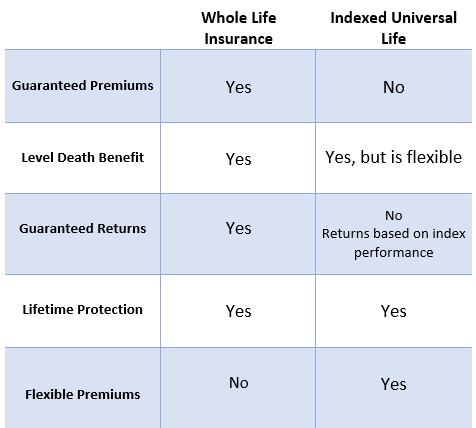All Categories
Featured
Table of Contents
Do they contrast the IUL to something like the Vanguard Total Supply Market Fund Admiral Shares with no lots, an expenditure proportion (ER) of 5 basis factors, a turn over proportion of 4.3%, and a remarkable tax-efficient record of circulations? No, they contrast it to some dreadful actively taken care of fund with an 8% lots, a 2% EMERGENCY ROOM, an 80% turnover proportion, and an awful document of short-term resources gain distributions.
Shared funds frequently make yearly taxable distributions to fund proprietors, even when the value of their fund has gone down in value. Shared funds not only call for income coverage (and the resulting yearly tax) when the common fund is increasing in worth, however can likewise enforce revenue taxes in a year when the fund has decreased in worth.
That's not exactly how mutual funds function. You can tax-manage the fund, harvesting losses and gains in order to reduce taxable circulations to the capitalists, but that isn't somehow going to transform the reported return of the fund. Just Bernie Madoff kinds can do that. IULs prevent myriad tax traps. The possession of shared funds might need the common fund proprietor to pay projected taxes.

IULs are simple to position to make sure that, at the proprietor's fatality, the recipient is exempt to either revenue or estate tax obligations. The very same tax obligation reduction strategies do not function virtually as well with common funds. There are many, frequently expensive, tax obligation catches connected with the timed trading of mutual fund shares, traps that do not relate to indexed life insurance policy.
Chances aren't really high that you're mosting likely to undergo the AMT as a result of your mutual fund distributions if you aren't without them. The remainder of this one is half-truths at finest. While it is true that there is no income tax due to your heirs when they inherit the proceeds of your IUL policy, it is additionally real that there is no revenue tax obligation due to your heirs when they acquire a shared fund in a taxed account from you.
Iul Life Insurance Canada
There are much better ways to prevent estate tax concerns than buying financial investments with low returns. Common funds may cause income taxation of Social Security advantages.

The development within the IUL is tax-deferred and may be taken as free of tax income through finances. The policy proprietor (vs. the shared fund supervisor) is in control of his or her reportable income, therefore enabling them to decrease or perhaps remove the tax of their Social Security benefits. This is great.
Below's an additional minimal issue. It's true if you get a common fund for state $10 per share prior to the distribution day, and it distributes a $0.50 distribution, you are after that going to owe tax obligations (possibly 7-10 cents per share) although that you have not yet had any type of gains.
In the end, it's really concerning the after-tax return, not just how much you pay in taxes. You're likewise probably going to have even more money after paying those taxes. The record-keeping demands for owning mutual funds are significantly extra intricate.
With an IUL, one's documents are kept by the insurance provider, copies of annual declarations are sent by mail to the owner, and distributions (if any) are totaled and reported at year end. This one is also type of silly. Certainly you must keep your tax obligation records in case of an audit.
Ul Mutual Insurance Company
Rarely a reason to acquire life insurance policy. Mutual funds are typically part of a decedent's probated estate.
Furthermore, they go through the hold-ups and expenses of probate. The earnings of the IUL plan, on the various other hand, is constantly a non-probate circulation that passes beyond probate straight to one's called beneficiaries, and is consequently exempt to one's posthumous creditors, undesirable public disclosure, or similar delays and costs.
We covered this one under # 7, but just to recap, if you have a taxable mutual fund account, you should place it in a revocable trust fund (and even simpler, utilize the Transfer on Death classification) in order to prevent probate. Medicaid incompetency and life time income. An IUL can provide their proprietors with a stream of revenue for their whole life time, no matter the length of time they live.

This is valuable when organizing one's events, and transforming assets to earnings before an assisted living facility arrest. Shared funds can not be transformed in a similar fashion, and are usually considered countable Medicaid assets. This is one more stupid one promoting that inadequate individuals (you recognize, the ones who need Medicaid, a government program for the poor, to pay for their retirement home) need to utilize IUL rather than common funds.
Ideal Universal Life
And life insurance coverage looks awful when contrasted rather against a pension. Second, people that have money to get IUL above and beyond their pension are going to have to be awful at handling cash in order to ever receive Medicaid to spend for their retirement home prices.
Chronic and terminal health problem biker. All policies will permit an owner's simple accessibility to cash money from their plan, frequently forgoing any surrender fines when such people experience a major disease, need at-home treatment, or end up being confined to an assisted living facility. Shared funds do not offer a comparable waiver when contingent deferred sales fees still relate to a mutual fund account whose proprietor needs to offer some shares to money the prices of such a keep.
Flexlife Indexed Universal Life
You obtain to pay even more for that advantage (rider) with an insurance coverage policy. Indexed universal life insurance provides death benefits to the beneficiaries of the IUL owners, and neither the owner neither the beneficiary can ever before shed cash due to a down market.
I definitely don't require one after I get to monetary freedom. Do I want one? On standard, a buyer of life insurance pays for the real expense of the life insurance advantage, plus the expenses of the policy, plus the earnings of the insurance policy business.
Death Benefit Option 1
I'm not completely certain why Mr. Morais threw in the entire "you can not shed money" again below as it was covered quite well in # 1. He simply desired to duplicate the very best marketing factor for these points I mean. Again, you do not shed small bucks, yet you can shed genuine bucks, along with face significant opportunity price because of reduced returns.

An indexed global life insurance policy plan proprietor might exchange their policy for a totally various policy without setting off earnings taxes. A mutual fund owner can not relocate funds from one common fund company to another without marketing his shares at the former (hence triggering a taxed occasion), and redeeming brand-new shares at the last, often based on sales charges at both.
While it holds true that you can trade one insurance plan for an additional, the reason that individuals do this is that the initial one is such a dreadful policy that also after acquiring a new one and going with the very early, adverse return years, you'll still appear ahead. If they were marketed the right policy the very first time, they shouldn't have any need to ever exchange it and go through the early, adverse return years once again.
Latest Posts
Net Payment Cost Index Life Insurance
Best Iul Insurance Companies
Index Linked Term Insurance